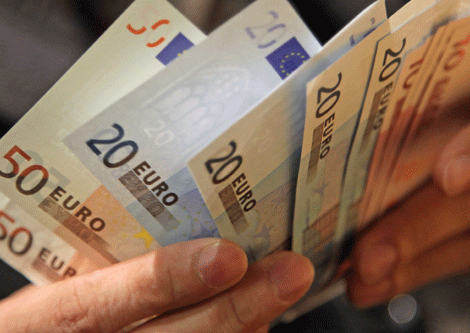Euro's attractiveness as reserve declining
Updated: 2012-02-09 07:55
By Wei Tian (China Daily)
|
|||||||||||
|
 Data from the State Administration of Foreign Exchange show that China's foreign-exchange reserves stood at $3.18 trillion at the end of 2011, with about one-fifth believed to be in euro-denominated assets. [Tomohiro Ohsumi / Bloomberg] |
Nations looking to diversify not likely to turn to EFSF, Fitch says
BEIJING - The euro will be a less attractive option for China as a reserve currency as the eurozone debt crisis worsens, senior executives at Fitch Ratings Ltd said in Beijing on Wednesday.
Andrew Colquhoun, Fitch's head of Asia-Pacific sovereign ratings, suggested that countries such as China that want to diversify their reserve holdings away from the dollar will be less likely to build up positions in the euro until the crisis is resolved.
In the short term, he said, the European debt crisis will have a negative effect on China's economic growth, mainly through trade channels.
Over the longer term, the depreciation of the euro will also pose a challenge to the management of the foreign-exchange reserves of the world's second-largest economy.
Data from the State Administration of Foreign Exchange show that China's foreign-exchange reserves stood at $3.18 trillion at the end of 2011, with about one-fifth believed to be in euro-denominated assets.
Although China needs euro assets as an alternative investment for its reserves, it was unlikely that the country would put "big money" into the European Financial Stability Fund (EFSF), said Tony Stringer, chief operating officer of global sovereigns and supranationals at Fitch.
Stringer warned that such a move would put China's huge reserves at risk because of possible capital losses if the EFSF's rating was downgraded.
Premier Wen Jiabao said earlier this month during a meeting with German Chancellor Angela Merkel that China was willing to "involve itself more" in efforts to resolve Europe's debt issues. But Wen stressed that efforts by European countries remained key to resolving the problem, and he urged indebted countries to implement appropriate financial policies in line with their real national situations.
"The ultimate solution of the debt crisis in Europe is dependent on financing provided by the European Central Bank (ECB)," Guan Jianzhong, chairman of the Chinese rating agency Dagong Global Credit Rating Co, said in research note.
Guan said that although this financing would avert a sudden bursting of the debt bubble, it would prolong the crisis and take it in an unpredictable direction.
He predicted that the ECB will take further easing measures such as interest rate cuts and open market operations to inject liquidity, which will lead to a depreciation of the euro.
The moves "will also be emulated by other global currencies eventually and damage the global currency system", he said.
Stringer said the rating gaps between developed economies and emerging ones will narrow further as the eurozone faces negative ratings actions while the credit of developing economies improves.
The global financial crisis has blurred distinctions between advanced and emerging economies, Fitch said in a report.
The accumulation of international reserves, greater monetary and exchange rate flexibility, moderate deficits and debt, strong growth and greater resilience to shocks has underpinned a broadly positive credit and ratings outlook for emerging markets, it said.
As for China, Fitch said that an economic rebalancing toward a more consumption-led growth model, in line with the authorities' policy objectives, would boost confidence in the sustainability of China's growth in the medium term, which will be positive for the ratings.
However, it said, the transition might increase macroeconomic volatility, which could be negative for the nation's ratings.
China Daily
Today's Top News
President Xi confident in recovery from quake
H7N9 update: 104 cases, 21 deaths
Telecom workers restore links
Coal mine blast kills 18 in Jilin
Intl scholarship puts China on the map
More bird flu patients discharged
Gold loses sheen, but still a safe bet
US 'turns blind eye to human rights'
Hot Topics
Lunar probe , China growth forecasts, Emission rules get tougher, China seen through 'colored lens', International board,
Editor's Picks

|

|

|

|

|

|





